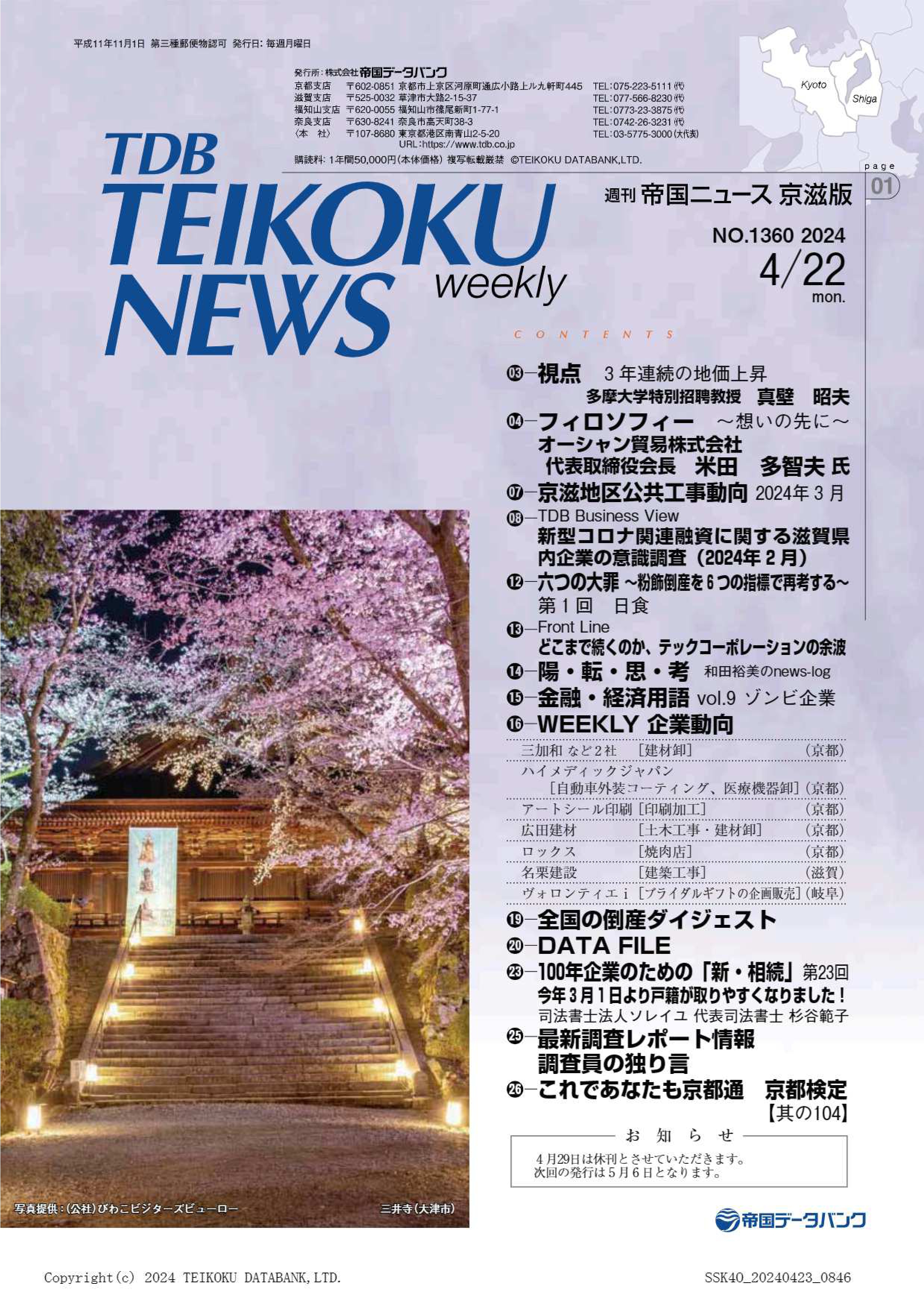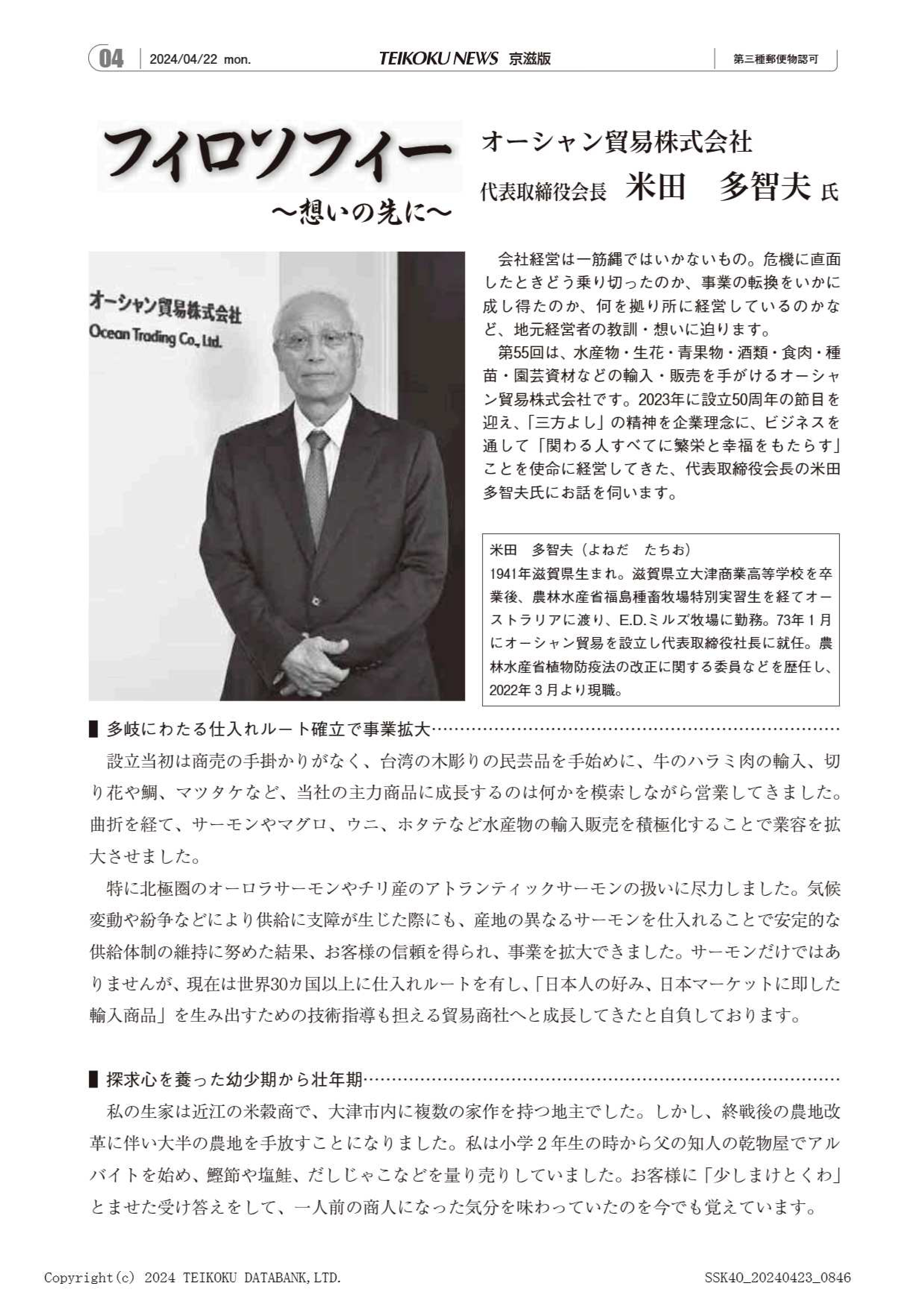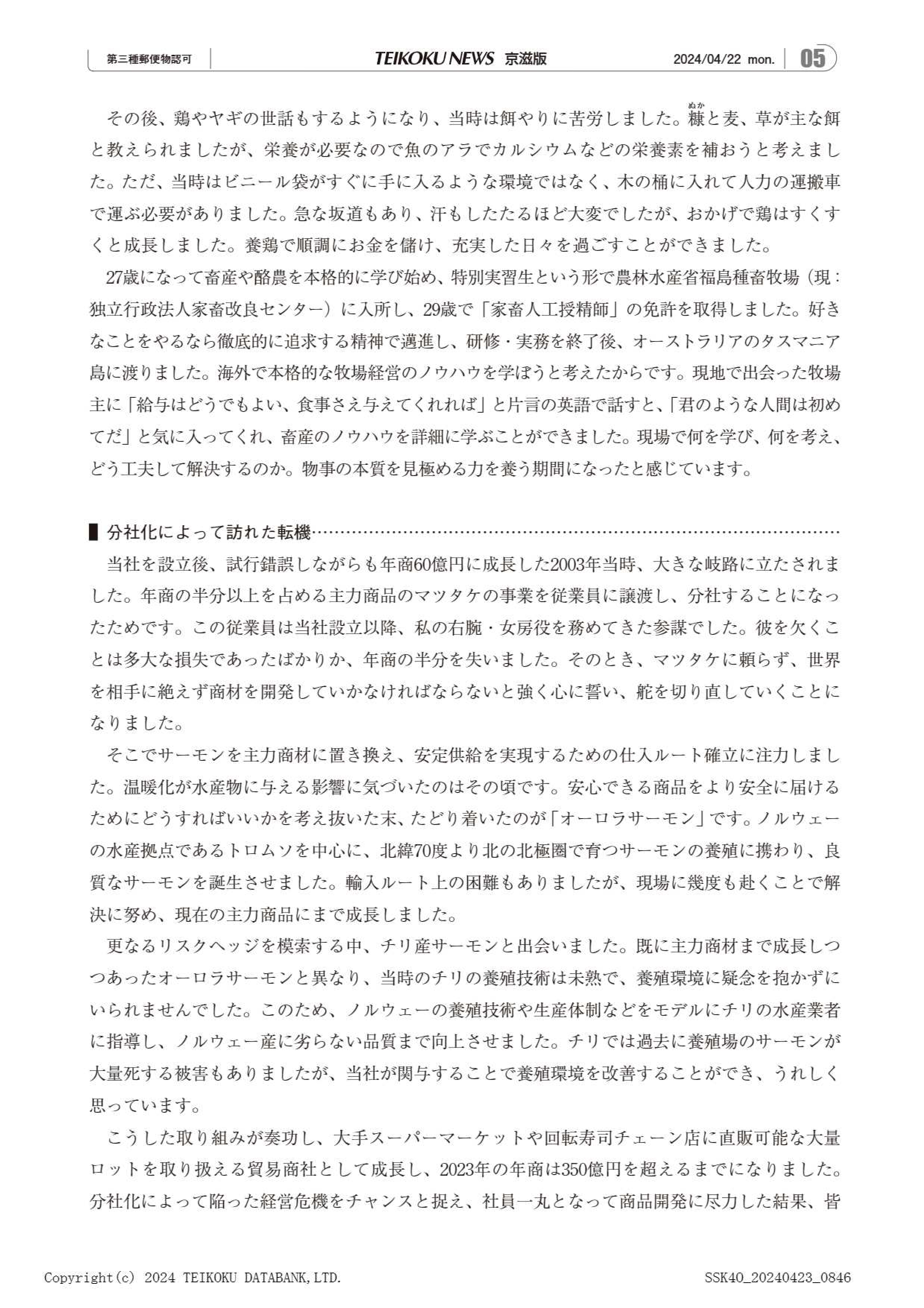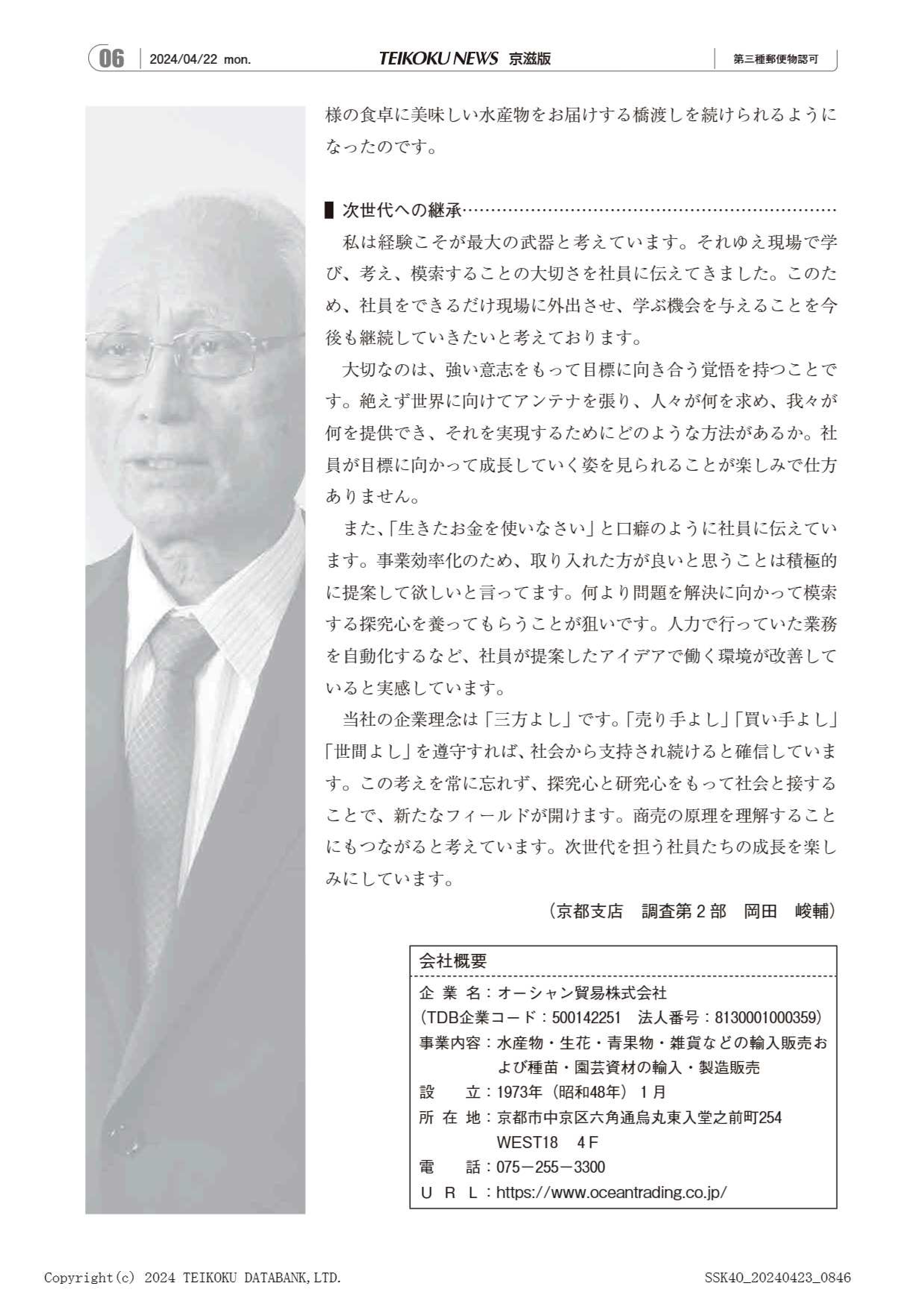Interview with Chairman Yoneda appeared in the April 22, 2024 issue of the Weekly Teikoku News.
Philosophy – Beyond Ideas
Running a company is no easy task. This series discusses the lessons and philosophies of local business leaders, exploring how they overcame crises, how they achieved business transformations, and the foundations of their management practices.
For the 54th installment, we speak with Ocean Trading Co., Ltd., a company dealing in imports and sales of seafood, flowers, produce, alcoholic beverages, meat, seeds, and gardening supplies.
Celebrating its 50th anniversary in 2023, the company has operated under the corporate philosophy of “Sanpo Yoshi” (benefiting the seller, buyer, and society) and the mission of bringing prosperity and happiness to all stakeholders through its business. We spoke with the company’s chairman, Tachio Yoneda.
Tachio Yoneda
Born in Shiga Prefecture in 1941.
After graduating from Shiga Prefectural Otsu Commercial High School, he became a special trainee at the National Livestock Breeding Center in Fukushima, and then worked at the E.D. Mills Ranch in Australia. In January 1973, he founded Ocean Trading and became company president. He has served as chairman of the Japan Flower Trade Association and a member of the committee involved in revisions to the Ministry of Agriculture, Forestry and Fisheries Plant Protection Act. He has held his current position since March 2022.
Expanding Business Through Diverse Sourcing Routes
Initially after the founding the company, with no clear business direction, we started by importing Taiwanese woodcarvings, then moved to importing skirt steak, flowers, sea bream, and matsutake mushrooms, all while searching for what could become our main product. After some twists and turns, we expanded our operations by actively pursuing the import and sale of seafood like salmon, tuna, sea urchin, and scallops.
We put particular effort into dealing in Aurora Salmon from the Arctic Circle and Atlantic salmon from Chile. Even when supply was disrupted due to climate change or conflicts, we were able to maintain a stable supply by sourcing salmon from different regions, gaining the trust of our customers and expanding our business. While not limited to salmon, we now have sourcing routes in over 30 countries worldwide and have grown into a trading company capable of providing technical advice on producing imported products tailored to Japanese tastes and the Japanese market, which is a source of pride for us.
From a Childhood that Fostered Curiosity, into Adulthood
My family ran a rice merchant business in Omi (present-day Shiga Prefecture), and we were landowners with multiple properties in Otsu City. But after the agricultural land reform at the end of World War II, we had to relinquish most of our farmland. I started working part-time in a dry goods store owned by a friend of my father in the second grade, selling bonito flakes, salted salmon, and dried fish by weight. I remember feeling like a real merchant when I would tell customers, “I'll give you a little discount.”
Later, I also took care of chickens and goats, and at the time, feeding them was a struggle.
I was taught that their main feed was rice bran, barley, and grass, but I thought they needed nutrients, so I supplemented their diet with fish scraps for calcium and other nutrients. Back then, plastic bags weren't readily available, so I had to carry the feed in wooden buckets on a platform cart. It was a tough and sweaty job, especially on steep slopes, but it helped the chickens grow healthy and strong. The poultry business went well, allowing me to earn a steady income and live a fulfilling life.
At the age of 27, I began seriously studying livestock and dairy farming, enrolling as a special trainee at the National Livestock Breeding Center in Fukushima, where I obtained a license as an artificial insemination technician at 29. With a strong belief in pursuing what I was passionate about, after completing my training and practical work, I went to Tasmania, Australia. I wanted to go abroad to become knowledgeable about professional ranch management. When I met the ranch owner there and said in broken English, “I don't care about the pay, as long as you provide me with meals,” he took a liking to me, saying, “You're the first person like this I've met,” and I was able to learn the intricacies of livestock farming. I believe that period was crucial for developing the ability to truly understand things like how to learn on the job, think critically, and innovate solutions.
The Turning Point Brought by Spin-off
After founding the company, we grew through trial and error, achieving annual sales of 6 billion yen by 2003. But then we faced a major crossroads. We decided to spin off the matsutake mushroom business, which accounted for more than half of our annual sales, to an employee who had been a key advisor and my right-hand man since the company's inception. Losing him was not only a huge loss but also meant losing half of our annual sales. At that time, I vowed not to rely solely on matsutake mushrooms and to constantly develop new products for the global market, leading to a significant strategic shift.
As a result, we shifted our focus to salmon as our main product, concentrating on establishing a stable sourcing route to ensure a stable supply. It was around that time that I became aware of the effects of global warming on seafood products. After careful consideration of how to deliver safe and reliable products, we decided to focus on Aurora Salmon. We were involved in salmon aquaculture north of 70 degrees latitude in the Arctic Circle, primarily around Tromsø, a fishery hub in Norway, producing high-quality salmon.
Although there were challenges in the import route, we overcame them by visiting the sites numerous times, and Aurora Salmon has now grown to become one of our main products.
Seeking to further hedge our risk, we encountered Chilean salmon. Unlike Aurora Salmon, which had already grown to become a major product, Chile's fish farming techniques were not well developed at the time, and we had doubts about the farming environment. As a result, we advised Chilean fisheries based on the model of Norwegian farming techniques and production systems, improving the quality to match that of Norwegian products.
In the past, there had been incidents of mass die-offs at salmon farms in Chile, but I am pleased that our involvement helped improve the aquaculture environment.
These efforts have paid off, and we have grown into a trading company capable of handling large lots for direct sales to major supermarkets and conveyor belt sushi chain restaurants, with annual sales of over 35 billion yen in 2023.
By viewing the management crisis brought about by the spin-off as an opportunity and working together as a team to develop new products, we have been able to continue serving as a bridge to deliver delicious seafood to everyone's tables.
Passing the Torch to the Next Generation
I believe that experience is our greatest strength. That’s why I have emphasized to employees the importance of learning, thinking, and exploring in the field. I plan to continue providing employees with opportunities to go out into the field and learn going forward.
What matters is having the resolve to face challenges with a strong will. We must constantly be in tune with the world, understanding what people want, what we can offer, and how we can achieve it. I'm excited to see our employees grow towards these goals.
I also frequently tell our employees to spend money with purpose. I encourage them to actively suggest ideas they believe would improve business efficiency. Above all, my goal is to cultivate a spirit of inquiry towards solving problems. Automation of tasks previously done by hand is just one example where employee ideas have improved our work environment.
Our corporate philosophy is “Sanpo Yoshi.” I am confident that by adhering to this principle of benefiting the seller, buyer, and society, we will continue to earn society's support. By never forgetting this mindset and engaging with society with a spirit of inquiry and research, new fields will open up. I believe this also leads to an understanding of the fundamental principles of business. I look forward to witnessing the growth of employees who will lead the next generation.
Running a company is no easy task. This series discusses the lessons and philosophies of local business leaders, exploring how they overcame crises, how they achieved business transformations, and the foundations of their management practices.
For the 54th installment, we speak with Ocean Trading Co., Ltd., a company dealing in imports and sales of seafood, flowers, produce, alcoholic beverages, meat, seeds, and gardening supplies.
Celebrating its 50th anniversary in 2023, the company has operated under the corporate philosophy of “Sanpo Yoshi” (benefiting the seller, buyer, and society) and the mission of bringing prosperity and happiness to all stakeholders through its business. We spoke with the company’s chairman, Tachio Yoneda.
Tachio Yoneda
Born in Shiga Prefecture in 1941.
After graduating from Shiga Prefectural Otsu Commercial High School, he became a special trainee at the National Livestock Breeding Center in Fukushima, and then worked at the E.D. Mills Ranch in Australia. In January 1973, he founded Ocean Trading and became company president. He has served as chairman of the Japan Flower Trade Association and a member of the committee involved in revisions to the Ministry of Agriculture, Forestry and Fisheries Plant Protection Act. He has held his current position since March 2022.
Expanding Business Through Diverse Sourcing Routes
Initially after the founding the company, with no clear business direction, we started by importing Taiwanese woodcarvings, then moved to importing skirt steak, flowers, sea bream, and matsutake mushrooms, all while searching for what could become our main product. After some twists and turns, we expanded our operations by actively pursuing the import and sale of seafood like salmon, tuna, sea urchin, and scallops.
We put particular effort into dealing in Aurora Salmon from the Arctic Circle and Atlantic salmon from Chile. Even when supply was disrupted due to climate change or conflicts, we were able to maintain a stable supply by sourcing salmon from different regions, gaining the trust of our customers and expanding our business. While not limited to salmon, we now have sourcing routes in over 30 countries worldwide and have grown into a trading company capable of providing technical advice on producing imported products tailored to Japanese tastes and the Japanese market, which is a source of pride for us.
From a Childhood that Fostered Curiosity, into Adulthood
My family ran a rice merchant business in Omi (present-day Shiga Prefecture), and we were landowners with multiple properties in Otsu City. But after the agricultural land reform at the end of World War II, we had to relinquish most of our farmland. I started working part-time in a dry goods store owned by a friend of my father in the second grade, selling bonito flakes, salted salmon, and dried fish by weight. I remember feeling like a real merchant when I would tell customers, “I'll give you a little discount.”
Later, I also took care of chickens and goats, and at the time, feeding them was a struggle.
I was taught that their main feed was rice bran, barley, and grass, but I thought they needed nutrients, so I supplemented their diet with fish scraps for calcium and other nutrients. Back then, plastic bags weren't readily available, so I had to carry the feed in wooden buckets on a platform cart. It was a tough and sweaty job, especially on steep slopes, but it helped the chickens grow healthy and strong. The poultry business went well, allowing me to earn a steady income and live a fulfilling life.
At the age of 27, I began seriously studying livestock and dairy farming, enrolling as a special trainee at the National Livestock Breeding Center in Fukushima, where I obtained a license as an artificial insemination technician at 29. With a strong belief in pursuing what I was passionate about, after completing my training and practical work, I went to Tasmania, Australia. I wanted to go abroad to become knowledgeable about professional ranch management. When I met the ranch owner there and said in broken English, “I don't care about the pay, as long as you provide me with meals,” he took a liking to me, saying, “You're the first person like this I've met,” and I was able to learn the intricacies of livestock farming. I believe that period was crucial for developing the ability to truly understand things like how to learn on the job, think critically, and innovate solutions.
The Turning Point Brought by Spin-off
After founding the company, we grew through trial and error, achieving annual sales of 6 billion yen by 2003. But then we faced a major crossroads. We decided to spin off the matsutake mushroom business, which accounted for more than half of our annual sales, to an employee who had been a key advisor and my right-hand man since the company's inception. Losing him was not only a huge loss but also meant losing half of our annual sales. At that time, I vowed not to rely solely on matsutake mushrooms and to constantly develop new products for the global market, leading to a significant strategic shift.
As a result, we shifted our focus to salmon as our main product, concentrating on establishing a stable sourcing route to ensure a stable supply. It was around that time that I became aware of the effects of global warming on seafood products. After careful consideration of how to deliver safe and reliable products, we decided to focus on Aurora Salmon. We were involved in salmon aquaculture north of 70 degrees latitude in the Arctic Circle, primarily around Tromsø, a fishery hub in Norway, producing high-quality salmon.
Although there were challenges in the import route, we overcame them by visiting the sites numerous times, and Aurora Salmon has now grown to become one of our main products.
Seeking to further hedge our risk, we encountered Chilean salmon. Unlike Aurora Salmon, which had already grown to become a major product, Chile's fish farming techniques were not well developed at the time, and we had doubts about the farming environment. As a result, we advised Chilean fisheries based on the model of Norwegian farming techniques and production systems, improving the quality to match that of Norwegian products.
In the past, there had been incidents of mass die-offs at salmon farms in Chile, but I am pleased that our involvement helped improve the aquaculture environment.
These efforts have paid off, and we have grown into a trading company capable of handling large lots for direct sales to major supermarkets and conveyor belt sushi chain restaurants, with annual sales of over 35 billion yen in 2023.
By viewing the management crisis brought about by the spin-off as an opportunity and working together as a team to develop new products, we have been able to continue serving as a bridge to deliver delicious seafood to everyone's tables.
Passing the Torch to the Next Generation
I believe that experience is our greatest strength. That’s why I have emphasized to employees the importance of learning, thinking, and exploring in the field. I plan to continue providing employees with opportunities to go out into the field and learn going forward.
What matters is having the resolve to face challenges with a strong will. We must constantly be in tune with the world, understanding what people want, what we can offer, and how we can achieve it. I'm excited to see our employees grow towards these goals.
I also frequently tell our employees to spend money with purpose. I encourage them to actively suggest ideas they believe would improve business efficiency. Above all, my goal is to cultivate a spirit of inquiry towards solving problems. Automation of tasks previously done by hand is just one example where employee ideas have improved our work environment.
Our corporate philosophy is “Sanpo Yoshi.” I am confident that by adhering to this principle of benefiting the seller, buyer, and society, we will continue to earn society's support. By never forgetting this mindset and engaging with society with a spirit of inquiry and research, new fields will open up. I believe this also leads to an understanding of the fundamental principles of business. I look forward to witnessing the growth of employees who will lead the next generation.






 Back to index
Back to index